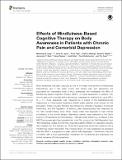| dc.contributor.author | de Jong, Marasha | en_US |
| dc.contributor.author | Lazar, Sara W. | en_US |
| dc.contributor.author | Hug, Kiran | en_US |
| dc.contributor.author | Mehling, Wolf E. | en_US |
| dc.contributor.author | Hölzel, Britta K. | en_US |
| dc.contributor.author | Sack, Alexander T. | en_US |
| dc.contributor.author | Peeters, Frenk | en_US |
| dc.contributor.author | Ashih, Heidi | en_US |
| dc.contributor.author | Mischoulon, David | en_US |
| dc.contributor.author | Gard, Tim | en_US |
| dc.date.accessioned | 2016-08-09T14:52:16Z | |
| dc.date.issued | 2016 | en_US |
| dc.identifier.citation | de Jong, Marasha, Sara W. Lazar, Kiran Hug, Wolf E. Mehling, Britta K. Hölzel, Alexander T. Sack, Frenk Peeters, Heidi Ashih, David Mischoulon, and Tim Gard. 2016. “Effects of Mindfulness-Based Cognitive Therapy on Body Awareness in Patients with Chronic Pain and Comorbid Depression.” Frontiers in Psychology 7 (1): 967. doi:10.3389/fpsyg.2016.00967. http://dx.doi.org/10.3389/fpsyg.2016.00967. | en |
| dc.identifier.issn | 1664-1078 | en |
| dc.identifier.uri | http://nrs.harvard.edu/urn-3:HUL.InstRepos:27822099 | |
| dc.description.abstract | Body awareness has been proposed as one of the major mechanisms of mindfulness interventions, and it has been shown that chronic pain and depression are associated with decreased levels of body awareness. We investigated the effect of Mindfulness-Based Cognitive Therapy (MBCT) on body awareness in patients with chronic pain and comorbid active depression compared to treatment as usual (TAU; N = 31). Body awareness was measured by a subset of the Multidimensional Assessment of Interoceptive Awareness (MAIA) scales deemed most relevant for the population. These included: Noticing, Not-Distracting, Attention Regulation, Emotional Awareness, and Self-Regulation. In addition, pain catastrophizing was measured by the Pain Catastrophizing Scale (PCS). These scales had adequate to high internal consistency in the current sample. Depression severity was measured by the Quick Inventory of Depressive Symptomatology—Clinician rated (QIDS-C16). Increases in the MBCT group were significantly greater than in the TAU group on the “Self-Regulation” and “Not Distracting” scales. Furthermore, the positive effect of MBCT on depression severity was mediated by “Not Distracting.” These findings provide preliminary evidence that a mindfulness-based intervention may increase facets of body awareness as assessed with the MAIA in a population of pain patients with depression. Furthermore, they are consistent with a long hypothesized mechanism for mindfulness and emphasize the clinical relevance of body awareness. | en |
| dc.language.iso | en_US | en |
| dc.publisher | Frontiers Media S.A. | en |
| dc.relation.isversionof | doi:10.3389/fpsyg.2016.00967 | en |
| dc.relation.hasversion | http://www.ncbi.nlm.nih.gov/pmc/articles/PMC4927571/pdf/ | en |
| dash.license | LAA | en_US |
| dc.subject | mindfulness-based cognitive therapy | en |
| dc.subject | mindfulness meditation | en |
| dc.subject | interoceptive awareness | en |
| dc.subject | body awareness | en |
| dc.subject | pain catastrophizing | en |
| dc.subject | chronic pain | en |
| dc.subject | depression | en |
| dc.subject | mediation | en |
| dc.title | Effects of Mindfulness-Based Cognitive Therapy on Body Awareness in Patients with Chronic Pain and Comorbid Depression | en |
| dc.type | Journal Article | en_US |
| dc.description.version | Version of Record | en |
| dc.relation.journal | Frontiers in Psychology | en |
| dash.depositing.author | Lazar, Sara W. | en_US |
| dc.date.available | 2016-08-09T14:52:16Z | |
| dc.identifier.doi | 10.3389/fpsyg.2016.00967 | * |
| dash.contributor.affiliated | Lazar, Sara | |
| dash.contributor.affiliated | Mischoulon, David | |


